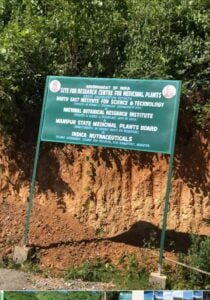Cannabis seed is a health food and cannabis oil extracted from its seeds has high market value and contains very little THC. But it must be done after the law is amended and in the present context with law as supreme, without proper rules and regulations no license can be given and without license it just can’t be grown and must be destroyed.

By RK Nimai
Paojel Chaoba, Executive Editor of The Frontier Manipur, a news portal in its Facebook page on August 2, had uploaded a visual claiming that cannabis have been planted in large scale in 2/3 hill slopes at Gotangkot, a Vaiphei village near Andro under Island SD of Kangpokpi District. The plantation was done by Indica Neutraceuticals and the signboard placed therein contains the Ashoka Chakra and mentions North East Institute of Science & Technology, (NEIST) Jorhat, National Botanical Research Institute, (NBRI) Lucknow and Manipur State Medicinal Plants Board (MSMPB) at a location designated as Site for Research Centre for Medicinal Plants. Except from CADA, there has been no reaction. It may be appreciated that a MOU was signed between NBRI and MSMPB on 14.12.2020 for collaborative work in terms of taking up of cost effective activities on Medicinal and Aromatic plants in Manipur. Indica Neutraceuticals have reportedly been granted licence to deal in bulk medicinal plant products by the State Ayurvedic Drugs Licensing Authority who is the Director of AYUSH, Govt of Manipur. The surprising element is that Indica Neutraceuticals was a company registered only on July 19,2020 and had not furnished any return to the registering authority as per the latter’s website.

WATCH THIS:
Cannabis has long been used in India and though it contains more than a hundred alkaloids, the main psychoactive component is tetrahydrocannabinol (THC). It also contains cannabidiol (CBC) which is used in a variety of ways.
Cannabis comes under the Narcotic Drugs and Psychotropic Substances Act, 1985 and the Rules made thereunder. Cannabis (Hemp) is defined under the Act as (a) charas, that is, separated resin, in whatever form, whether crude or purified, obtained from cannabis plant and also includes concentrated preparation and resin known as hashish oil or liquid hashish; (b) ganja, that is, the flowering or fruiting tops of cannabis plant (excluding the seeds and leaves when not accompanied by the tops), by whatever name they may be known or designated; and (c) any mixture, with or without any neutral material, of any of the above forms of cannabis or any drink prepared thereform. Thus the sale and consumption of the resin and flowers are prohibited and punishable while sale or consumption of bhang which is the seeds and leaves is not.
The Act inter-alia provides that no person shall cultivate cannabis plant or produce, manufacture, possess, sell, purchase, transport, warehouse, use, consume, import inter-State, export inter-State, import into India, export from India or tranship and narcotic or psychotropic substance, except for medical or scientific purposes and in the manner and to the extent provided by the provisions of the Act or the Rules made thereunder and in a case where any such provisions, imposes any requirement by way of licence, permit or authorisation also in accordance with the terms and conditions of such licence, permit or authorisation.
READ THIS:
Under the Act, the Central Government empowers the State governments to (a) permit and regulate, by way of rules to be formulated by the State Government the cultivation of any cannabis plant, production, manufacture, possession, transport, import and export inter-state, sale, purchase, consumption or use of cannabis (excluding charas) and such rules in particular and without prejudice to the generality of the above may empower the State Government to provide that the limits within which licences may be given for the cultivation of any cannabis plant shall be fixed from time to time by or under the orders of the State Government; provide that only the cultivators licensed by the prescribed authority of the State Government shall be authorised to engage in cultivation; require that all cannabis, the produce of the land cultivated with cannabis plant, shall be delivered by the cultivators to the officers of the State Government authorised in this behalf; empower the State Government to fix from time to time, the price to be paid to the cultivators for the cannabis delivered; prescribe the forms and conditions of licenses or permits for the purpose specified and the authorities by which such licenses or permits may be granted and the fees that may be charged therefor. In order to manufacture/ cultivate cannabis, licences are required also under the Drugs & Cosmetic Act, 1940 as well as under the AYUSH laws and guidelines.
When the UN Single Convention on Narcotic Drugs was signed in 1961 to combat drug consumption through coordinated international intervention, it was on India’s insistence that bhang was not included among drugs as it has been socially accepted for four thousand years. The Convention is an international treaty to control activities (production, supply, trade, use) of specific narcotic drugs and establishes a system of regulations (licenses, measures for treatment, research, etc) for their medicinal and scientific uses. At the 63rd Session of the UN Convention of Narcotic Drugs held from 2nd to 4th December 2020, India voted to remove cannabis and its resin from Schedule IV of the 1961 Single Convention on Narcotic Drugs. But without change in the national laws, the existing law continues to apply.
From a legal point of view the State Government can issue licenses for growing cannabis provided proper policy and rules are framed. This writer is not aware of any Rules being framed under the NDPS Act to regulate the cultivation of cannabis and would be grateful if anyone can point out the correct position. Since the signboard at the plantation site inscribe NEIST, Jorhat, NBRI, Lucknow and MSMPB, these three organisations must clarify whether they had entered into an agreement with Indica Neutraceuticals and if so the terms and conditions. If not they should file a complaint for misusing their good names.
Cannabis variety which contain less than 0.3% THC is regarded as industrial hemp and state like Himachal Pradesh had permitted cultivation of industrial hemp or cannabis for extraction of fibres and for collection of seeds which contain 49% high quality edible oil with traces of THC with 76% polyunsaturated fatty acids, 5-11% monounsaturated fatty acids and 5-7% polysaturated fatty acids, with a low smoke point of 166 Cº against 193 Cº for olive oil, 227 Cº for sunflower oil and 238 Cº for mustard oil. Himachal Pradesh still is yet to issue licence for cultivation of cannabis for medicinal purposes.
It has been learnt that NBRI had conducted a small research on the THC content of 13 samples of Cannabis collected from different parts of Manipur and in one sample the THC content is very low well below the 0.3% and this variety can be grown for industrial purposes.
The State Government is silent on the issue and need to clarify whether rules relating to the cultivation of cannabis have been framed and notified and whether Indica Neutraceuticals have been granted permit to cultivate cannabis and if so under what provision and under what terms and conditions. The licensing authority cannot be the State Ayurvedic Drugs Licensing Authority and has to be the State Government. If any licence was granted, what are the terms and conditions and how the produce will be utilised and who has been designated as the authority to receive the produce. If no licence was granted, it must act immediately to cut down the plantation as the State Government is on War on Drugs 2.0 and if the plantation is not destroyed, it will be deemed that the Government’s effort is mainly lip service as under the extant law growing of cannabis is illegal and any Government must abide by the law.
The writer propagates legalising cannabis as most users do not migrate to hard drugs and it has high medicinal value. Cannabis seed is a health food and cannabis oil extracted from its seeds has high market value and contains very little THC. But it must be done after the law is amended and in the present context with law as supreme, without proper rules and regulations no licence can be given and without licence it just can’t be grown and must be destroyed. Police destroys small plantation and seizes marijuana from time to time but inaction on this reported plantation is nothing but double speak.
(RK Nimai is a Retired IAS officer)
